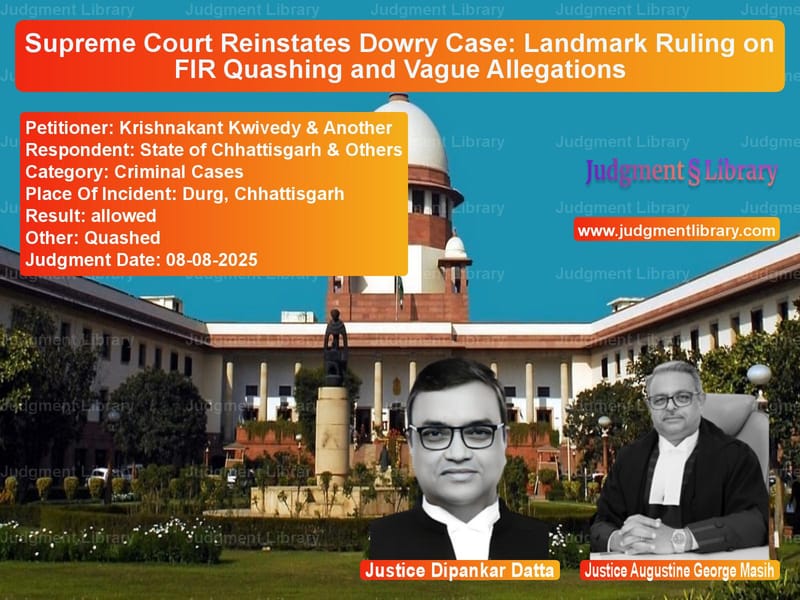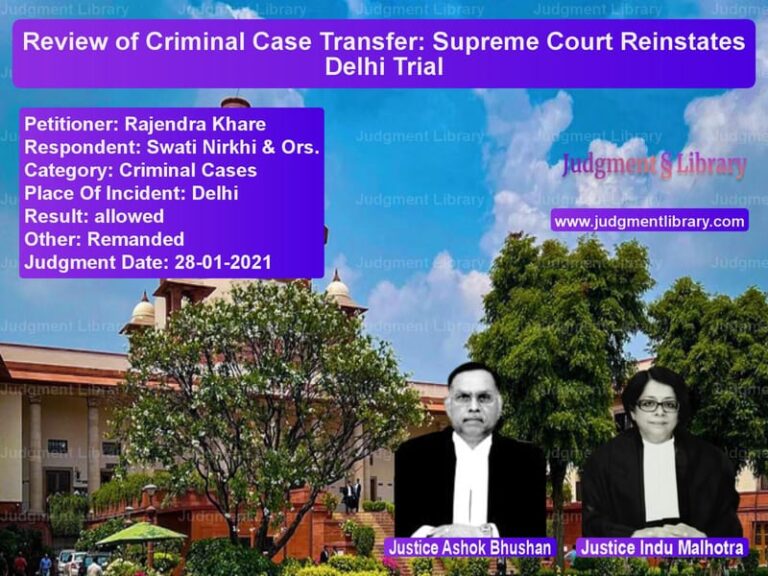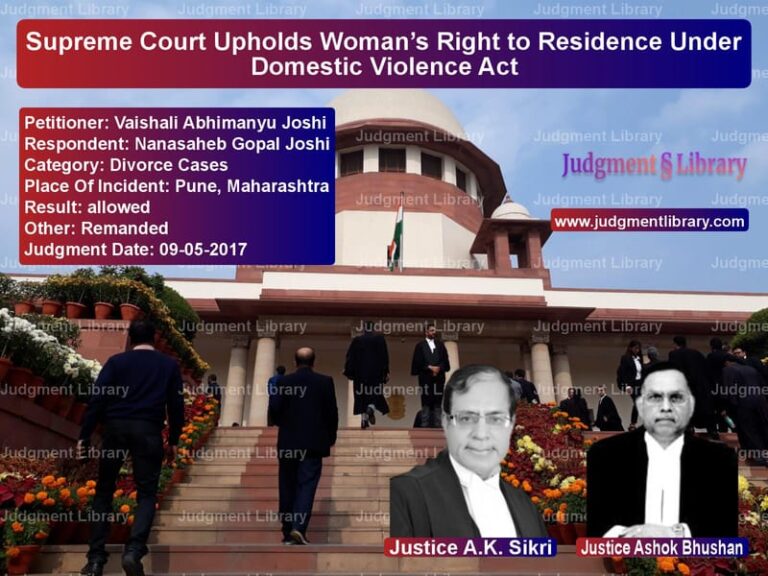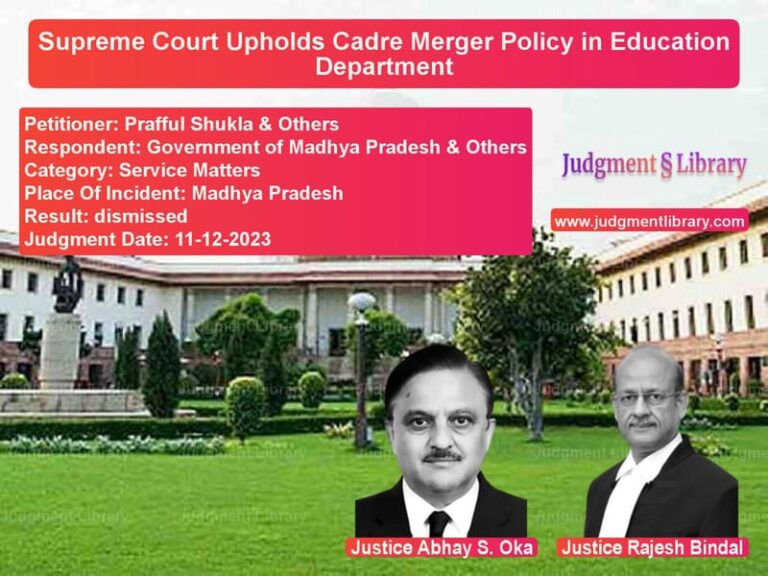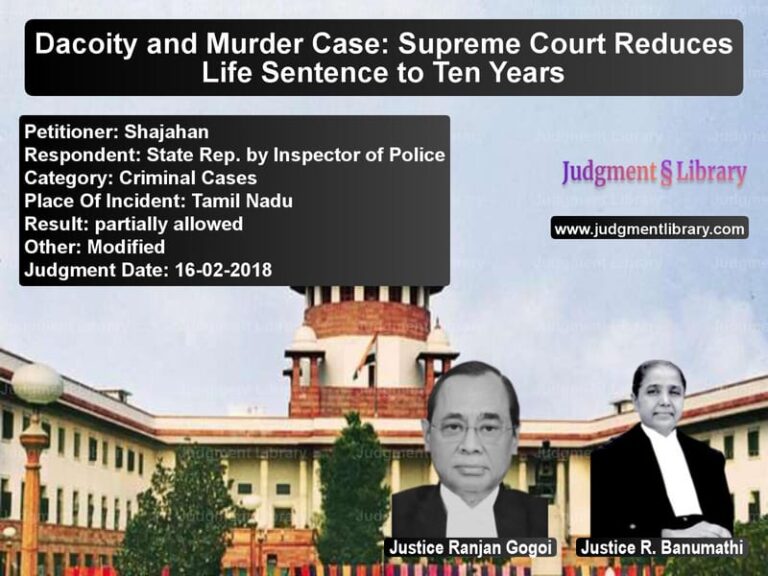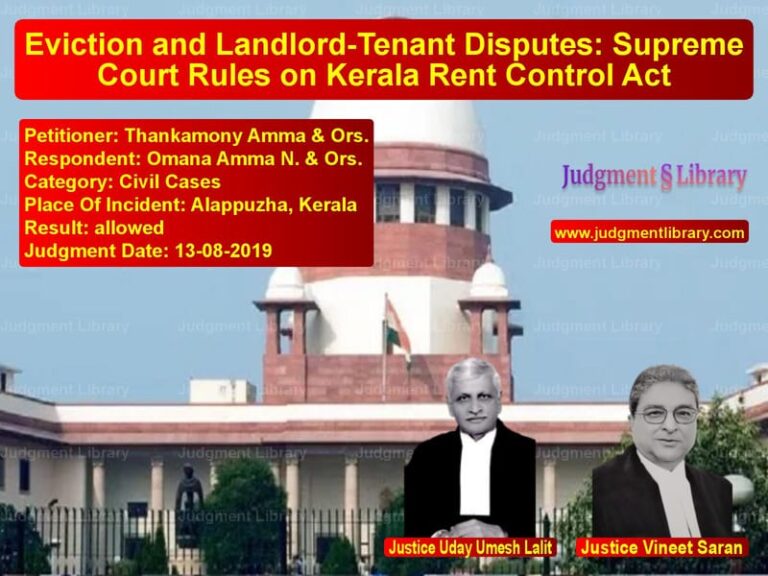Supreme Court Reinstates Dowry Case: Landmark Ruling on FIR Quashing and Vague Allegations
In a significant ruling that reinforces the sanctity of criminal proceedings in dowry harassment cases, the Supreme Court of India delivered a judgment on August 8, 2025, setting aside an order by the Chhattisgarh High Court. The High Court had earlier quashed criminal proceedings against three members of a family accused of demanding dowry, citing vague allegations. The apex court, however, found this reasoning flawed and restored the case, emphasizing that the First Information Report (FIR) contained specific and detailed allegations that warranted a full trial. This case originated from a failed marriage proposal between the daughter of Krishnakant Kwivedy (the first appellant) and the son of the accused family. The marriage negotiations fell through in 2016, leading to allegations that the groom’s family had persistently demanded dowry, including cash and a car, which the bride’s family could not meet. An FIR was registered under Sections 3 and 4 of the Dowry Prohibition Act, 1961, and after investigation, a charge-sheet was filed. However, the High Court, in an order dated August 20, 2024, quashed the proceedings against the groom’s father, mother, and brother, while allowing the case to continue only against the groom himself. The Supreme Court’s decision to overturn this ruling highlights critical legal principles regarding the quashing of FIRs and the interpretation of dowry laws.
The High Court’s Reasoning and the Supreme Court’s Disagreement
The Chhattisgarh High Court, in its impugned order, had quashed the proceedings against the second, third, and fourth respondents (the groom’s father, mother, and brother) on the ground that the allegations against them were vague and omnibus in nature. The High Court stated that even if taken at face value, the allegations did not prima facie constitute an offence under the Dowry Prohibition Act. However, the Supreme Court bench comprising Justices Dipankar Datta and Augustine George Masih strongly disagreed with this assessment. After a thorough perusal of the FIR, the Supreme Court found that the allegations were, in fact, specific and contained detailed particulars of dates, times, and the nature of demands. The Court explicitly noted: Having read the FIR as it is, we do find specific and definite allegations with particulars of dates and time being disclosed which, prima facie, contain ingredients of offences allegedly committed by the 2nd, 3rd and 4th respondents punishable under the relevant law. The judges expressed bewilderment at the High Court’s conclusion, stating, In fact, on a bare reading of the FIR, we are left to wonder what more was required of the 1st appellant to allege that could, in the view of the High Court, constitute full and fair disclosure of offences. This strong rebuttal underscores the Court’s view that the FIR met all necessary legal standards to proceed to trial.
Specific Allegations Outlined in the FIR
The Supreme Court meticulously detailed the direct allegations against the accused family members as they appeared in the FIR. These allegations were pivotal to the Court’s decision. They included that on June 4, 2016, the fourth respondent (the groom’s brother) came to Durg to discuss the marriage and suddenly demanded Rs. 10 lakh and a vehicle. Subsequently, on the day of the ’tilak’ ceremony on July 10, 2016, the second to fifth respondents were given Rs. 2 lakh in cash, clothes, silverware, and other articles by the first appellant. The appellants had also incurred significant expenses by booking a marriage venue (Indralok Bhavan) and a hotel (Sheetla) for guests after paying advances. Crucially, on August 21, 2016, the third respondent (the groom’s mother) had a telephonic conversation with the first appellant where she once again demanded Rs. 10 lakh and a car as dowry. When the first appellant refused, the marriage was called off. The Supreme Court found that these allegations, with their specific mention of dates, amounts, and individuals involved, were far from vague and clearly disclosed the ingredients of offences under the Dowry Prohibition Act.
Arguments by the Respondents and the Court’s Rejection
During the proceedings, the senior counsel for the second, third, and fourth respondents did not seek to defend the High Court’s order on the grounds of vagueness. Instead, he advanced two new arguments. First, he contended that the first appellant had made a misrepresentation to the second respondent about his social and financial status. Second, he relied on the landmark case of State of Haryana v. Bhajan Lal, arguing that the criminal proceedings were manifestly attended with mala fide and were instituted with an ulterior motive for wreaking vengeance, and thus should be quashed. The Supreme Court, however, rejected both contentions. On the issue of misrepresentation, the Court held that it was entirely a question of fact that could not be decided at the stage of quashing an FIR. The Court stated: First, whether or not there has been misrepresentation is entirely a question of fact which cannot be decided at the stage when the inherent powers of the High Court are invoked for quashing of an FIR/criminal proceedings. Such a question obviously has to be left for a decision at the trial, if at all a defence to that effect is raised, and it would then be for the trial court to consider the same while it returns its findings on the question of guilt or otherwise. Regarding the Bhajan Lal precedent, the Court clarified that for proceedings to be quashed on grounds of mala fide, the malice must be manifest on the face of the FIR. It observed: Secondly, the expression ‘manifestly attended with mala fide’ following criminal proceedings, as appearing in clause 7 of paragraph 102 of Bhajanlal (supra) makes the position clear that mala fide must be manifest on the face of the FIR. The present case does not fall in that category. The Court also noted that the High Court had not quashed the proceedings on this ground, making the argument even less tenable.
Conclusion and Implications of the Judgment
Allowing the appeal, the Supreme Court set aside the impugned order of the High Court, stating that it had committed a serious error and occasioned a grave failure of justice. The Court directed that the criminal proceedings arising from the FIR must be taken to their logical conclusion in accordance with the law. It also clarified that none of its observations should influence the trial court. This judgment serves as a crucial reminder of the limited scope of the High Court’s inherent powers under Section 482 of the CrPC. It reinforces that FIRs should not be quashed at the threshold merely because allegations are perceived as vague, especially when they contain specific details of time, place, and demand. The ruling strengthens the legal framework against dowry demands, ensuring that cases get a fair trial and are not dismissed prematurely. For the general public, this judgment underscores the seriousness with which the judiciary views dowry-related offences and the importance of detailed and timely reporting of such crimes.
Petitioner Name: Krishnakant Kwivedy & Another.Respondent Name: State of Chhattisgarh & Others.Judgment By: Justice Dipankar Datta, Justice Augustine George Masih.Place Of Incident: Durg, Chhattisgarh.Judgment Date: 08-08-2025.Result: allowed.
Don’t miss out on the full details! Download the complete judgment in PDF format below and gain valuable insights instantly!
Download Judgment: krishnakant-kwivedy-vs-state-of-chhattisgar-supreme-court-of-india-judgment-dated-08-08-2025.pdf
Directly Download Judgment: Directly download this Judgment
See all petitions in Dowry Cases
See all petitions in Fraud and Forgery
See all petitions in Bail and Anticipatory Bail
See all petitions in Extortion and Blackmail
See all petitions in Judgment by Dipankar Datta
See all petitions in Judgment by Augustine George Masih
See all petitions in allowed
See all petitions in Quashed
See all petitions in supreme court of India judgments August 2025
See all petitions in 2025 judgments
See all posts in Criminal Cases Category
See all allowed petitions in Criminal Cases Category
See all Dismissed petitions in Criminal Cases Category
See all partially allowed petitions in Criminal Cases Category

